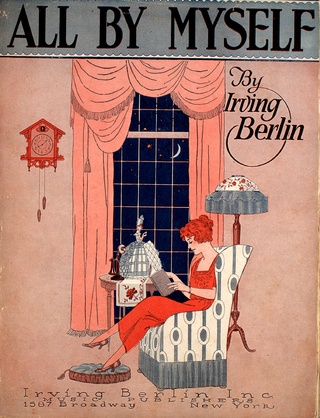Related Research Articles
"All Alone" is a popular waltz ballad composed by Irving Berlin in 1924. It was interpolated into the Broadway show The Music Box Revue of 1924 where it was sung by Grace Moore and Oscar Shaw. Moore sat at one end of the stage under a tightly focused spotlight, singing it into a telephone, while Oscar Shaw sat at the other, doing the same.
"Heat Wave" is a popular song written by Irving Berlin for the 1933 musical As Thousands Cheer, and introduced in the show by Ethel Waters.
"Don't Take Your Love from Me" is a popular song written by Henry Nemo and published in 1941. Mildred Bailey first recorded this song in 1940 before publication. It was introduced that year by singer Joan Brooks.
"I Had the Craziest Dream" is a popular song which was published in 1942. The music was written by Harry Warren, the lyrics by Mack Gordon.
"South of the Border Down Mexico Way" is a popular song describing a trip to Mexico, written by Jimmy Kennedy and Michael Carr and published in 1939 for the film of the same name starring country star Gene Autry.

"You'd Be Surprised" is a song written by Irving Berlin in 1919 which Eddie Cantor interpolated it into Ziegfeld's Follies of 1919. Cantor soon recorded it and it became a major hit. Other popular versions in 1920 were by the All-Star Trio and by Irving Kaufman.
"Let's Fall in Love" is a song written by Harold Arlen (music) and Ted Koehler (lyrics) for the film Let's Fall in Love and published in 1933. In the film, it is heard during the opening credits and later sung by Art Jarrett and chorus, and by Ann Sothern.
"Everything I Have Is Yours" is a popular song. The music was written by Burton Lane, the lyrics by Harold Adamson. The song was published in 1933. It was first sung by Art Jarrett in the 1933 film Dancing Lady.
"Fine and Dandy" is a popular song from the 1930 Broadway musical of the same name.
"Top Hat, White Tie and Tails" is a popular song written by Irving Berlin for the 1935 film Top Hat, where it was introduced by Fred Astaire.
"Isn't This a Lovely Day?" is a popular song written by Irving Berlin for the 1935 film Top Hat, where it was introduced by Fred Astaire in the scene where his and Ginger Rogers' characters are caught in a gazebo during a rainstorm. The lyric is an example of a song which turns a bad situation into a love song, a common style for Irving Berlin, as in I've Got My Love to Keep Me Warm and Let's Have Another Cup of Coffee.
"Slumming on Park Avenue" is a popular song written by Irving Berlin for the 1937 film On the Avenue, where it was introduced by Alice Faye. Popular recordings in 1937 were by Red Norvo and his Orchestra, Fletcher Henderson and by Jimmie Lunceford.
"Reaching for the Moon" is a popular song written by Irving Berlin for the 1930 musical film of the same name.
"I've Got Five Dollars" is a 1931 popular song composed by Richard Rodgers, with lyrics by Lorenz Hart for the musical America's Sweetheart (1931) where it was introduced by Harriette Lake and Jack Whiting.
"Old Devil Moon" is a popular song composed by Burton Lane with lyrics by Yip Harburg for the 1947 musical Finian's Rainbow. It was introduced by Ella Logan and Donald Richards in the Broadway show. The song takes its title from a phrase in "Fun to Be Fooled", a song that Harburg wrote with Harold Arlen and Ira Gershwin for the 1934 musical Life Begins at 8:40.
"Say It Isn't So" is a popular torch song by Irving Berlin, published in 1932. The song was written when Berlin was suffering a loss of confidence following several setbacks, and he initially placed the song in a drawer, feeling that it would not be successful. However, one of Berlin's employees, Max Winslow, heard it, and on his own initiative, took it to Rudy Vallée, who was then a major star on radio. Vallee sang it on his radio show and it became an immediate hit.

"All by Myself" is a popular song written by Irving Berlin, published in 1921.
"Please Be Kind" is a 1938 American song composed by Saul Chaplin with lyrics by Sammy Cahn. Popular recordings that year were by Mildred Bailey and the Red Norvo Orchestra; Bob Crosby & His Orchestra ; and by Benny Goodman & His Orchestra.
"Blame It on My Youth" is a jazz standard written by Oscar Levant (music) and Edward Heyman (lyrics) in 1934.
"Blues in My Heart" is a 1931 jazz standard. It was written by Benny Carter and Irving Mills.
References
- ↑ Whitburn, Joel (1986). Joel Whitburn's Pop Memories 1890-1954 . Menomonee Falls, Wisconsin: Record Research Inc. p. 517. ISBN 0-89820-083-0.
- 1 2 "Al Bowlly Club". Albowlly.club. Retrieved March 29, 2020.
- ↑ "The Great British Dance Bands Play The Music Of Irving Berlin 1931-39 (1978, Vinyl)". Discogs.com. December 1978. Retrieved 25 December 2021.
- ↑ "I Never Had A Chance". Archive.org. 15 June 1934. Retrieved 25 December 2021.
- ↑ "The Songs Of Irving Berlin (2004, CD)". Discogs.com. Retrieved 25 December 2021.
- ↑ "jazzdisco.org". Jazzdisco.org. Retrieved March 29, 2020.
- ↑ Tosches, Nick (1992). Dino - Living High in the Dirty Business of Dreams. New York: Dell Publishing. p. 588. ISBN 0-440-21412-2.
- ↑ "45cat.com". 45cat.com. Retrieved March 29, 2020.
- ↑ "www.allmusic.com". allmusic.com. Retrieved May 3, 2024.
- ↑ "www.allmusic.com". allmusic.com. Retrieved May 4, 2024.
- ↑ "www.allmusic.com". allmusic.com. Retrieved May 4, 2024.
- ↑ "The Allen Toussaint Orchestra – Irving Berlin's 20 Greatest Themes (Dancing Cheek To Cheek) (CD)". Discogs.com. 25 March 2020. Retrieved 25 December 2021.
- ↑ "The Memory Lingers On - The Songs of Irving Berlin - Retrospective RTS4287 [BMC] Classical Music Reviews: April 2016". Musicweb-international.com. Retrieved 25 December 2021.